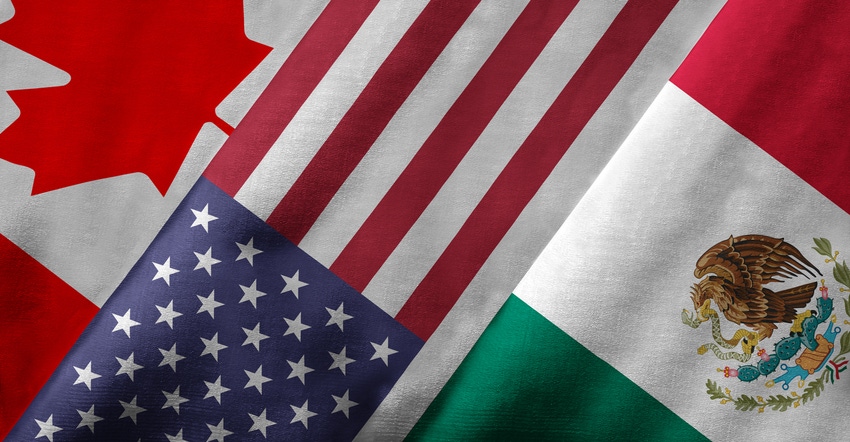Deal needed by end of week to ensure Congress gets new North American trade agreement done in 2019.

It has now been more than a year since the leaders of Canada, Mexico and the U.S. signed their new regional trade pact, the U.S.-Mexico-Canada Agreement (USMCA).
In a floor speech on Monday afternoon, Senate Finance Committee chairman Chuck Grassley (R., Iowa) told colleagues in the House and officials in the Administration, “By all accounts, a deal is close on USMCA.”
Yet, Grassley warned that the end of this year’s legislative session is rapidly approaching. “If a deal cannot be reached by the end of this week, I do not see how USMCA can be ratified in 2019,” Grassley said.
In a statement Nov. 29, speaker of the House Nancy Pelosi (D., Cal.) said through negotiations with U.S. Trade Representative Robert Lighthizer, House Democrats are “within range of a substantially improved agreement for America’s workers. Now, we need to see our progress in writing from [USTR] for final review.”
During a media call Tuesday morning, former Senate Agriculture Committee chair Blanche Lincoln (D., Ark.), who currently serves as a spokesperson for Farmers for Free Trade, said with members of Congress back in town this week, now is when “the rubber meets the road” on USMCA passage. “Negotiators are on the cusp to agreeing to changes. There should be nothing stopping them to get this across the aisle quickly,” she added.
Lincoln acknowledged Congress's end-of-the-year schedule is full, but leadership needs to pick and choose priorities as they go forward in the next several weeks. She said USMCA passage is the top priority for U.S. agriculture.
Tom Vilsack, a former secretary of agriculture, said it is really key for Congress to get this job done. He recognized the work Lighthizer has done to be responsive to Democrats’ concerns so that, at the end of the day, it can be a solid agreement garnering consensus.
Vilsack said he had a conversation with a member of Congress Tuesday morning and conveyed the importance of getting this done to help her district and prove that House Democrats can work across the aisle to get something meaningful done in swing districts. “She is now empowered to go back to the speaker,” he added.
Vilsack, who currently serves as president and chief executive officer of the U.S. Dairy Export Council, expressed confidence that when Pelosi brings up USMCA for a vote, it will get to 218 yeas.
“USMCA does two very important things for American agriculture: It guarantees open access to critical markets in Canada and Mexico, and for the dairy farmers of this country, it provides additional access to a market that has been closed for far too long in Canada — additional access in terms of the ability to sell more product in Canada, but also an end to a discriminatory pricing system that the Canadians have established,” Vilsack said on the call.
American agriculture is struggling, and Farmers for Free Trade noted that USMCA is a “badly needed victory that will help restore certainty for farmers, ranchers and rural communities.” In her remarks, Lincoln said the U.S. food and agriculture industries export $20.5 billion of goods to Canada and $18.6 billion to Mexico annually. Under the North American Free Trade Agreement (NAFTA), which USMCA updates and upgrades, agricultural exports from the U.S. to Canada and Mexico increased from $8.9 billion in 1993 to $39 billion in 2017.
A dozen executives from North America’s largest dairy companies will travel to Washington, D.C., on Wednesday to advocate directly with members of Congress and Trump Administration officials for passage of USMCA. The International Dairy Foods Assn. (IDFA), which represents more than 450 businesses throughout the dairy value chain, from dairy cooperatives to processors and retailers, organized the day of legislative action due to the growing importance of exports for dairy companies and producers. News reports about the status of USMCA change by the day, and signals from industry insiders are mixed, creating significant concern among dairy companies that rely on exports to remain profitable.
U.S. dairy exports to Mexico and Canada totaled approximately $1.5 billion in 2018, or more than 25% of total U.S. dairy exports. Without a modern trade deal in place, food and agricultural exports among North American nations remain uncertain, and dairy businesses are hesitant to make new investments, IDFA said in a statement.
“Passing USMCA should be a simple, bipartisan effort, considering the deal’s huge upside for the American economy,” IDFA president and CEO Dr. Michael Dykes said. “I’m grateful to the dairy industry leaders who are traveling to Washington this week in a last-ditch effort to save this deal. We remain hopeful that the House of Representatives can work with the Trump Administration to finalize USMCA before the year’s end and communicate a clear timeline for passing the agreement. Without reliable markets in North America, our dairy industry will face extreme financial challenges.”
Over the last 25 years, U.S. food and agricultural exports to Canada and Mexico have more than quadrupled under the current trade agreement, helping support more than 325,000 American jobs in food and agriculture and related sectors of the economy. USMCA builds on the success of NAFTA.
The International Trade Commission confirmed that USMCA would raise U.S. gross domestic product by $68.2 billion and pump an additional $2.2 billion, or 1.1%, into the U.S. economy through increases in agricultural and food exports. One in four American manufacturing jobs is related to agriculture, and USMCA, once implemented, will strengthen the U.S. farm and agricultural economy and further support and secure vital market access for U.S. farmers, ranchers and agribusinesses.
About the Author(s)
You May Also Like




.png?width=300&auto=webp&quality=80&disable=upscale)
